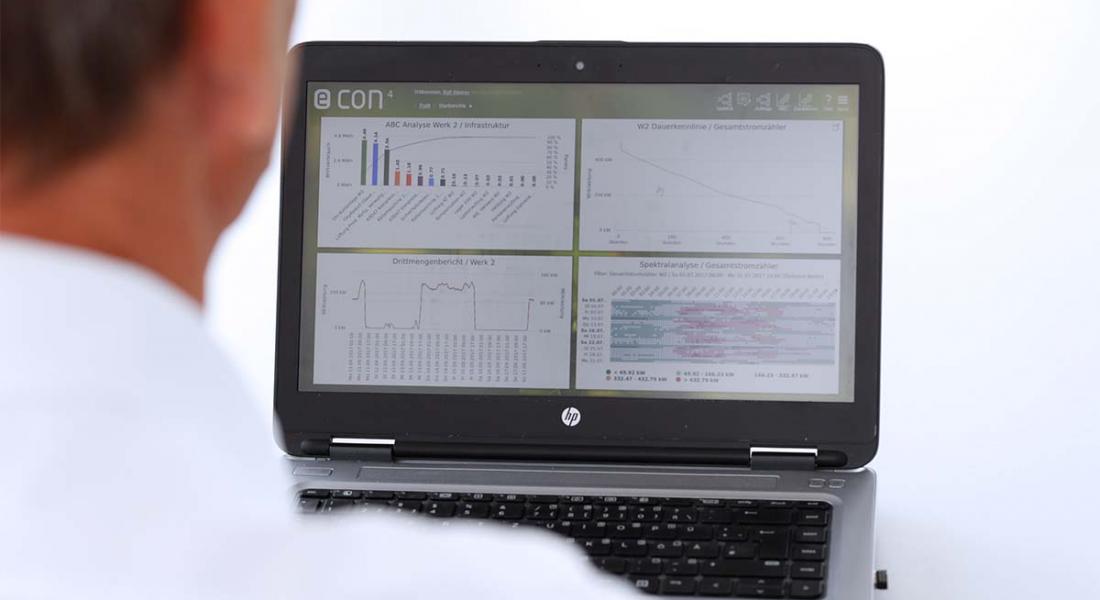Saving energy through consistent energy management

Climate neutrality and a halving of primary energy consumption by 2050 - without a significant increase in energy efficiency, Germany will miss this target. Against this backdrop and in view of sharply rising energy costs, companies are currently facing the challenge of reducing their energy consumption more than ever before. This is where energy management systems come into play. Both in private households and in industry, they offer the opportunity to reduce energy consumption and increase energy efficiency. Energy management systems are mainly used in companies, organizations and local authorities, but they can also be used to reduce consumption in private households. However, the most significant savings can probably be achieved in industry, particularly in the manufacturing sector, where energy costs usually account for an enormous proportion of total production costs.
The primary aim of an energy management system is to reduce energy consumption and thereby save costs. Storing energy makes sense for this, as it can then be made available at the right time, enabling savings to be made on electricity, hot water and heating. This aspect is particularly attractive if the energy is self-generated, e.g. by a PV system. Energy management systems basically consist of two components: Hardware and software. In combination, this ensures increased security of supply, i.e. that there is always enough energy available. This energy is then distributed sensibly from an ecological and economic point of view in line with the motto "Conserve resources, reduce costs, protect the climate". But how exactly does an energy management system ensure a reduction in energy consumption and costs, for example?
- Among other things, an energy management system detects unnoticed standby loads. Similar to private households, where certain devices are often constantly on standby (e.g. televisions), there are also devices and machines in the industrial environment that consume unnecessary amounts of energy after active use. It is precisely this unnecessary energy consumption during idle operation that can be identified with an energy management system. If inexplicably high standby loads are detected, a targeted search for their cause can be carried out in order to initiate appropriate countermeasures (e.g. switching off a machine). Conversely, this leads to a reduction in energy consumption and therefore to a reduction in energy costs.
- Another example is the ability to identify potential defects in machines. The energy consumption of individual machines and appliances is continuously measured and the data stored accordingly. By comparing current and historical data, conclusions can be drawn about anomalies using key figures, e.g. energy required per unit produced. For example, if unexpectedly more energy is suddenly required to produce the same number of items, it is worth checking the machine. This serves to identify errors in good time, which in the worst case could have led to production losses or downtimes.
The use of an energy management system can therefore be really worth it: it helps to identify unnecessarily high energy consumption, provides a clear list of energy consumption, helps to protect the environment and contributes to a massive reduction in energy costs. To date, the introduction of an energy management system has not been mandatory for all companies and is therefore not standard. But did you know that companies can expect further attractive benefits once it has been introduced? Companies can be partially exempt from the EEG surcharge and at the same time make substantial savings on electricity and energy tax! In addition, the obligation to undergo an annual energy audit will no longer apply. The prerequisite for these attractive conditions is an energy management system certified in accordance with DIN ISO 50001 or an EMAS-compliant environmental management system.
econ4 offers all the requirements of DIN EN ISO 50001:2018 and is therefore the ideal assistant for your entry into energy management and is also assessed as eligible for funding in accordance with BAFA. Our econ4 energy management software is currently one of the leading solutions for operational energy management. User-specific dashboards provide you with immediate graphical insights into your energy consumption. Especially in these challenging times, we want to help you achieve greater energy efficiency - which in turn leads to a reduction in your consumption and costs.